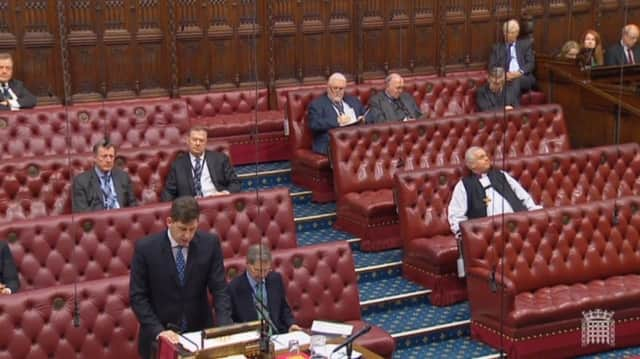Sam McBride: Deep flaws in how MPs are making NI's laws


The last eleven days have offered a glimpse of the deeply problematic way in which Northern Ireland is likely to be governed for the foreseeable future, where scrutiny of new laws is cursory - if there is any meaningful scrutiny at all.
Last Tuesday and Wednesday, the Secretary of State introduced three bills in the Commons – one set budgetary allocations, one gave her power to alter MLAs’ pay and a third increased the regional rate and extended the retrospective cut to RHI subsidies by another year.
Advertisement
Hide AdAdvertisement
Hide AdIn a largely empty chamber – although every Northern Ireland MP, except Sinn Féin’s abstentionist MPs, was present – many of the speeches focused on wider political matters rather than the fine detail in how the legislation was drafted.
One exception was East Belfast MP Gavin Robinson, a lawyer, who pressed the government around a potentially significant word in one of the clauses in the bill on MLA pay.
The previous day, MPs were an hour and a half into debating the Northern Ireland Budget (Anticipation and Adjustments) Bill before the legislation had been published on Parliament’s website.
The problem was, at least in part, caused by the government choosing to only table the legislation on the day that it was to be debated – part of a fast-track process which cut down on scrutiny not just at Westminster, but outside Parliament where anyone affected by the legislation had little chance to read it and raise concerns with their MP.
Advertisement
Hide AdAdvertisement
Hide AdOn Tuesday, the three bills came to the House of Lords. In a single debate, lasting less than two hours, peers were asked to scrutinise three entirely separate bills.
Some peers expressed a range of concerns about the content of the legislation – in particular the retrospective cut to RHI subsidies for those honest RHI claimants who entered the scheme, and took on large bank loans, in good faith. Former Stormont minister Lord Empey told peers: “To those who seek a return to direct rule in Northern Ireland, I point out that we are being asked to pass all stages of three bills in one afternoon, with no ability to delve into the detail. I ask those people: is this the way ahead? I think not.”
Over the space of three minutes as all stages of three bills were passed in the time it would take to make a cup of tea, the deputy speaker said 12 times: “As many as are of that opinion will say ‘content’...[shouts of ‘content’], the contrary ‘not content’; the ‘contents’ have it...”
It took eight days from the moment the first of the three bills were published to the moment they received Royal Assent on Wednesday.
Advertisement
Hide AdAdvertisement
Hide AdThe level of scrutiny could be improved by the government publishing legislation several weeks before it is debated, thus allowing some public debate and consideration by those directly impacted by each bill.
However, the fundamental problem of the legislation being fast-tracked – due to the lack of parliamentary time – through a chamber where most MPs have limited knowledge of or interest in the detail of the legislation will remain.
Alarmingly, the current level of scrutiny could decline still further if direct rule is formally implemented.
That could see a return to ‘orders in council’ – an archaic device which unlike primary legislation is unamendable by MPs, in effect moving much legislative power from the legislature to the government.
Advertisement
Hide AdAdvertisement
Hide AdIn the absence of devolution returning, one suggested solution is of a Stormont Assembly to scrutinise the work and legislation of direct rule ministers. But while that would improve scrutiny it could simply be a forum for populist opposition where MLAs had power without responsibility, denouncing every unpopular government decision. And such an Assembly is likely to be boycotted by nationalists, as happened with a similar venture in the 1980s.
The RHI scandal shows what happens when seemingly dry and uncontroversial legislation is not properly scrutinised. The current situation is even worse than that which failed to spot ‘cash for ash’.